7 Minimum viable product examples You Should Know
Discover the top 7 minimum viable product examples strategies and tips. Complete guide with actionable insights.

Launching a new product often feels like a high-stakes gamble, but it doesn’t have to be. The Minimum Viable Product (MVP) approach de-risks the process by focusing on a core set of features to solve a specific problem for early adopters. This strategy allows you to gather crucial user feedback without investing heavily in a fully-featured product that might miss the mark. Understanding how successful companies started is key to building your own.
This article breaks down real-world minimum viable product examples from major platforms like Amazon, Product Hunt, and Strategyzer. We will analyze the initial, stripped-down versions of these products, exploring the specific features they launched with and the strategic thinking behind their approach. Before you build, visualizing your product is a critical first step; this guide to creating mobile app mockups can help you craft compelling designs to validate your concept.
For each example, you will find a detailed breakdown covering:
- The core problem they aimed to solve.
- The specific, minimal features included in their MVP.
- Actionable takeaways and replicable strategies for your own project.
Our goal is to provide a clear, strategic playbook based on proven successes, helping you move from idea to a validated product efficiently.
1. Harvard Business Publishing Education
While most lists of minimum viable product examples focus on the end products themselves, Harvard Business Publishing (HBP) Education offers a unique resource: a deep dive into the process behind them. Instead of just showing you the "what," HBP provides access to a massive catalog of official Harvard Business School case studies that dissect the "how" and "why" of MVP strategy and execution.
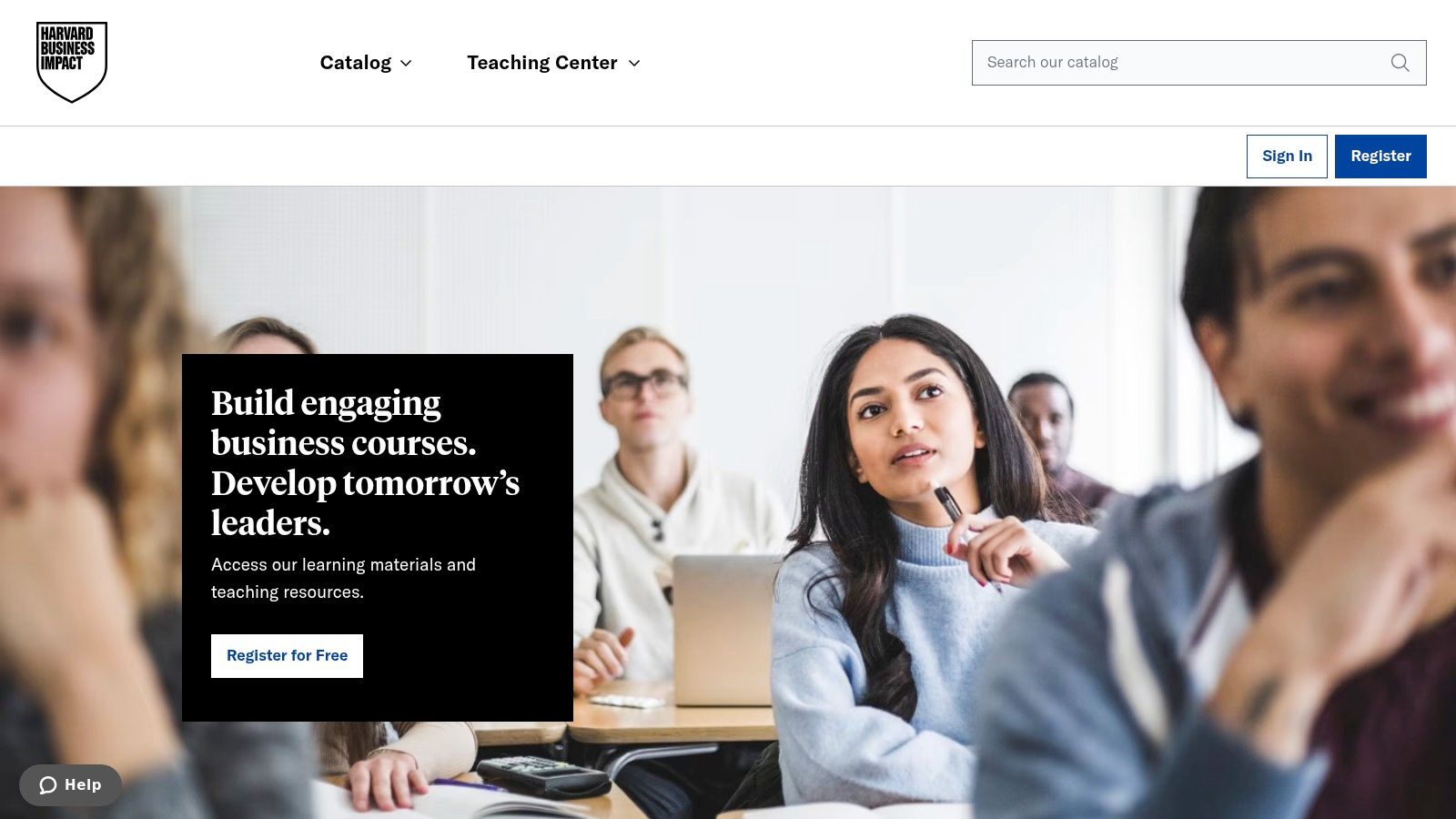
This platform is invaluable for founders and product managers who want to move beyond surface-level blog posts and learn from rigorously researched, peer-reviewed accounts of real-world business challenges. You can find detailed cases on how both startups and established enterprises scoped their MVPs, validated core hypotheses, and iterated based on market feedback.
Strategic Analysis
HBP’s core strength is its authoritative content. Each case study is a structured learning tool, often accompanied by teaching notes (for educators) and discussion questions that force you to think critically about the strategic trade-offs involved in building an MVP. It shifts the focus from a simple success story to a repeatable strategic framework.
- Deep Dives: Cases often include financial data, internal memos, and market analysis, providing a behind-the-scenes look you won't find elsewhere.
- Structured Learning: The format encourages analysis of failures and pivots, not just successes.
- Broad Applicability: You can find examples across industries, from tech and e-commerce to healthcare and manufacturing.
Key Takeaway: HBP Education is the best resource for learning the strategic thinking behind successful MVPs, not just observing the final product. It provides a structured, academic lens for deconstructing product development.
Practical Information
- Access: Many case studies can be purchased individually by anyone directly from the website, with prices typically ranging from $8 to $15 per case for digital delivery.
- Educator Resources: Full teaching notes and supplementary materials often require educator verification.
- User Experience: The website (https://hbsp.harvard.edu) features a powerful search engine with filters for subject, industry, and publication date, making it easy to find relevant case studies on MVP development and product management. The interface is clean, professional, and focused on content discovery.
2. The Case Centre
Similar to Harvard Business Publishing, The Case Centre is a non-profit organization dedicated to distributing business case studies from top global institutions. It serves as an essential aggregator, providing a massive library where product leaders can find diverse minimum viable product examples and strategic analyses beyond a single school's perspective. This makes it a one-stop shop for comparing different approaches to lean startup methodology and product validation.
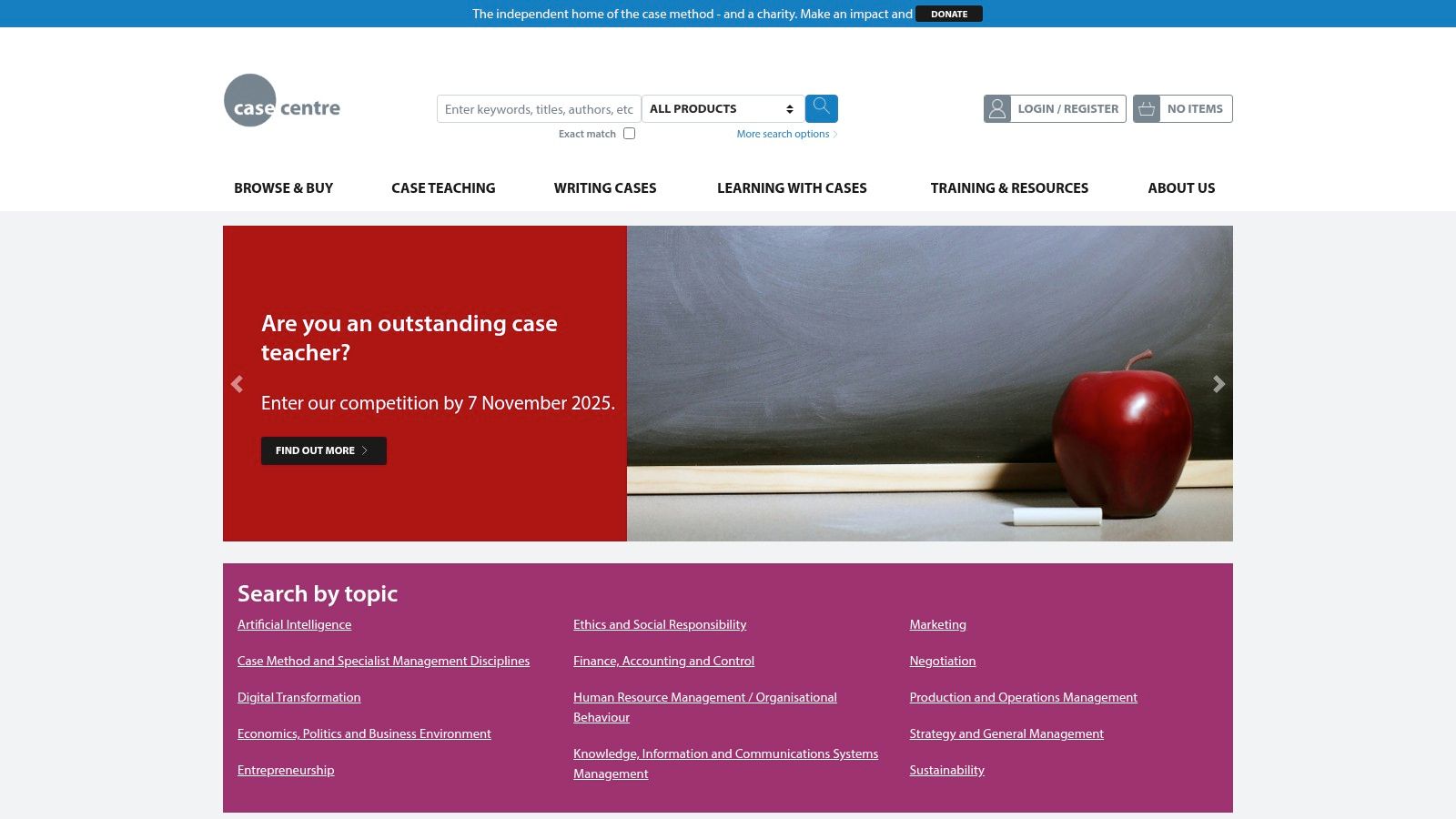
The platform is particularly valuable for its global scope, offering cases from schools like Ivey, INSEAD, and IMD alongside Harvard. This allows founders and managers to explore how MVP principles are applied in different market contexts and industries, providing a broader and more nuanced understanding of product strategy. It also includes unique formats like video supplements and business simulations to enrich the learning experience.
Strategic Analysis
The Case Centre’s primary advantage is its extensive, multi-school catalog, which fosters a comparative approach to learning. Instead of being limited to one institution's viewpoint, you can analyze how different strategic frameworks were used to tackle similar MVP challenges across the globe. This variety is critical for developing a flexible and adaptable product mindset.
- Global Perspectives: Access cases from a wide range of international business schools, offering diverse cultural and market insights into MVP execution.
- Multimedia Resources: Many cases are supplemented with video interviews with protagonists or detailed business simulations, providing more dynamic learning opportunities.
- Flexible Access: The platform is designed for both individual learners and corporate or academic groups, with tools for creating coursepacks.
Key Takeaway: The Case Centre is the ideal resource for gaining a global and comparative understanding of MVP strategy. Its diverse collection helps you move beyond a single school of thought and see how core principles are adapted worldwide.
Practical Information
- Access: Cases are available for individual purchase directly from the website, with transparent pricing, often in USD, making it easy for non-US buyers. Student discounts are also available.
- User Experience: The website (https://www.thecasecentre.org) offers robust search and filtering capabilities, allowing users to find cases by topic, school, or author. The interface is functional and focused on efficient content discovery.
- Limitations: Some classroom-use purchases may be subject to minimum order requirements, and publicly available teaching notes are not guaranteed for every case.
3. Strategyzer
Where other resources provide stories, Strategyzer provides the playbook. Born from the minds behind the seminal books Business Model Generation and Testing Business Ideas, this platform offers structured courses and tools that are essential for any team looking to de-risk their product launch. It's less about passive reading and more about active doing, providing hands-on canvases and experiment patterns to design, run, and assess your tests for minimum viable product examples.
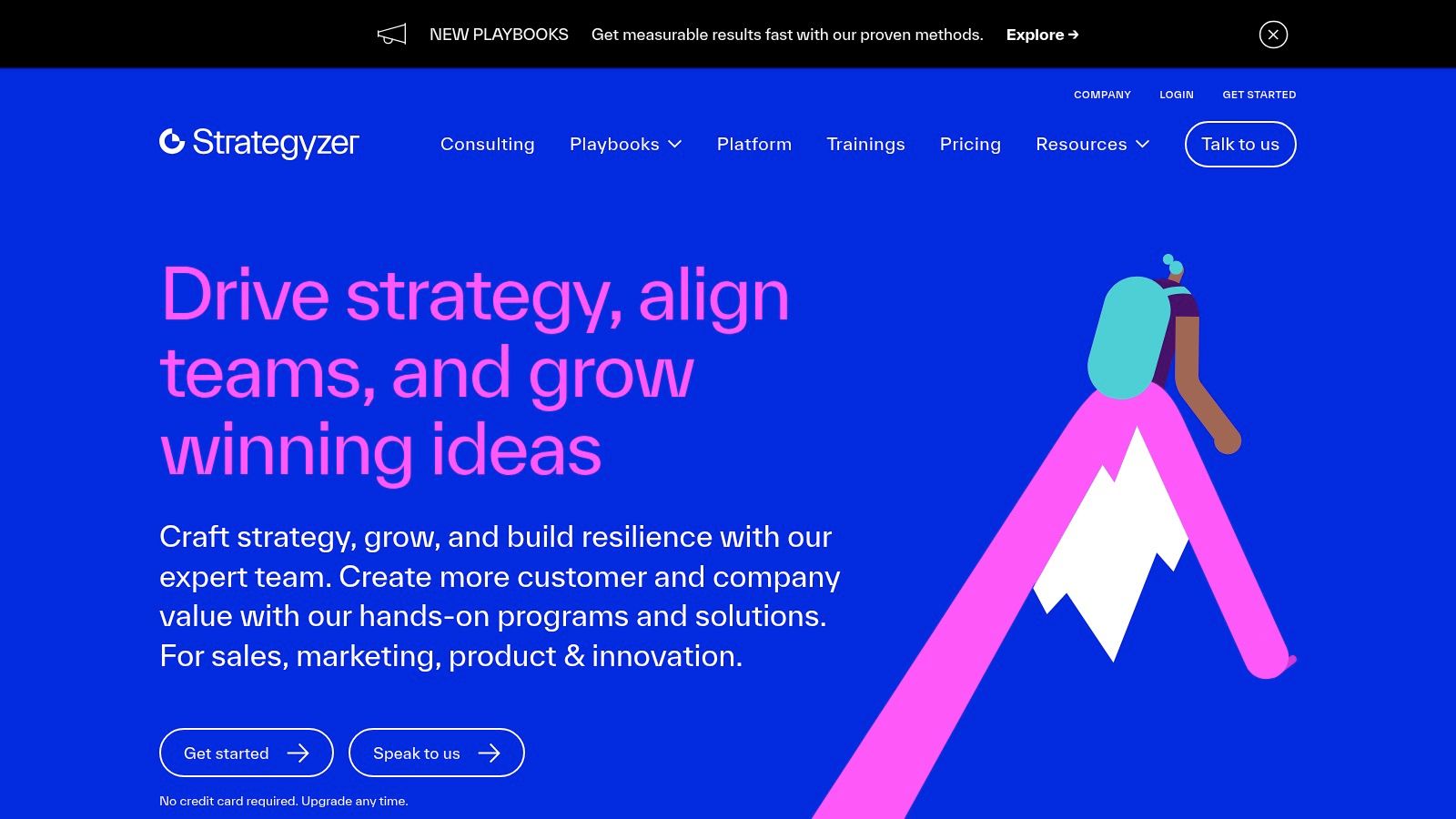
Strategyzer is the ideal resource for founders who want to move from abstract ideas to concrete, testable hypotheses. Its core philosophy is that a successful MVP isn't a single product but the result of a rigorous, evidence-based testing process. The platform equips you with the exact frameworks, like the Business Model Canvas and Value Proposition Canvas, to structure this process effectively. To deepen your understanding of turning these strategies into reality, you can explore MVP development services from experts like Strategyzer on 42coffeecups.com.
Strategic Analysis
Strategyzer's key differentiator is its library of practical, repeatable "experiment patterns." It transforms the vague concept of "testing your idea" into a catalog of specific actions, such as creating a landing page MVP, a "Wizard of Oz" test, or an explainer video. This gives teams a clear menu of options to choose from when validating their core assumptions, removing the guesswork.
- Actionable Frameworks: It provides direct access to widely adopted tools like the Value Proposition Canvas and Business Model Canvas, complete with case-style walkthroughs.
- Experiment Library: The platform includes a rich library of test patterns, each designed to validate specific types of business hypotheses (desirability, feasibility, viability).
- Structured Learning: The courses are designed to build a systematic, repeatable skill set in evidence-based entrepreneurship, not just provide one-off examples.
Key Takeaway: Strategyzer is the ultimate resource for learning and applying a systematic process for MVP testing. It provides the canvases, experiment formats, and learning structure to turn ideas into evidence.
Practical Information
- Access: The platform offers self-paced courses, such as "Mastering Business Testing," which typically include one-year access. Pricing is premium, with options to bundle courses and software access.
- Guarantees: Strategyzer offers a money-back guarantee on its courses and provides a certificate of completion for users who finish the program.
- User Experience: The website (https://www.strategyzer.com) is professionally designed, with clear navigation to its courses, tools, and blog content. The learning environment is structured to guide you step-by-step through the concepts and their practical application.
4. O’Reilly Learning
Similar to HBP, O’Reilly Learning provides a resource for understanding the methodology behind minimum viable product examples, but with a practical, hands-on focus for tech practitioners. Through its subscription-based library, O'Reilly offers deep dives into the technical and product management frameworks that power successful MVPs, such as Lean UX, Lean Analytics, and continuous experimentation.
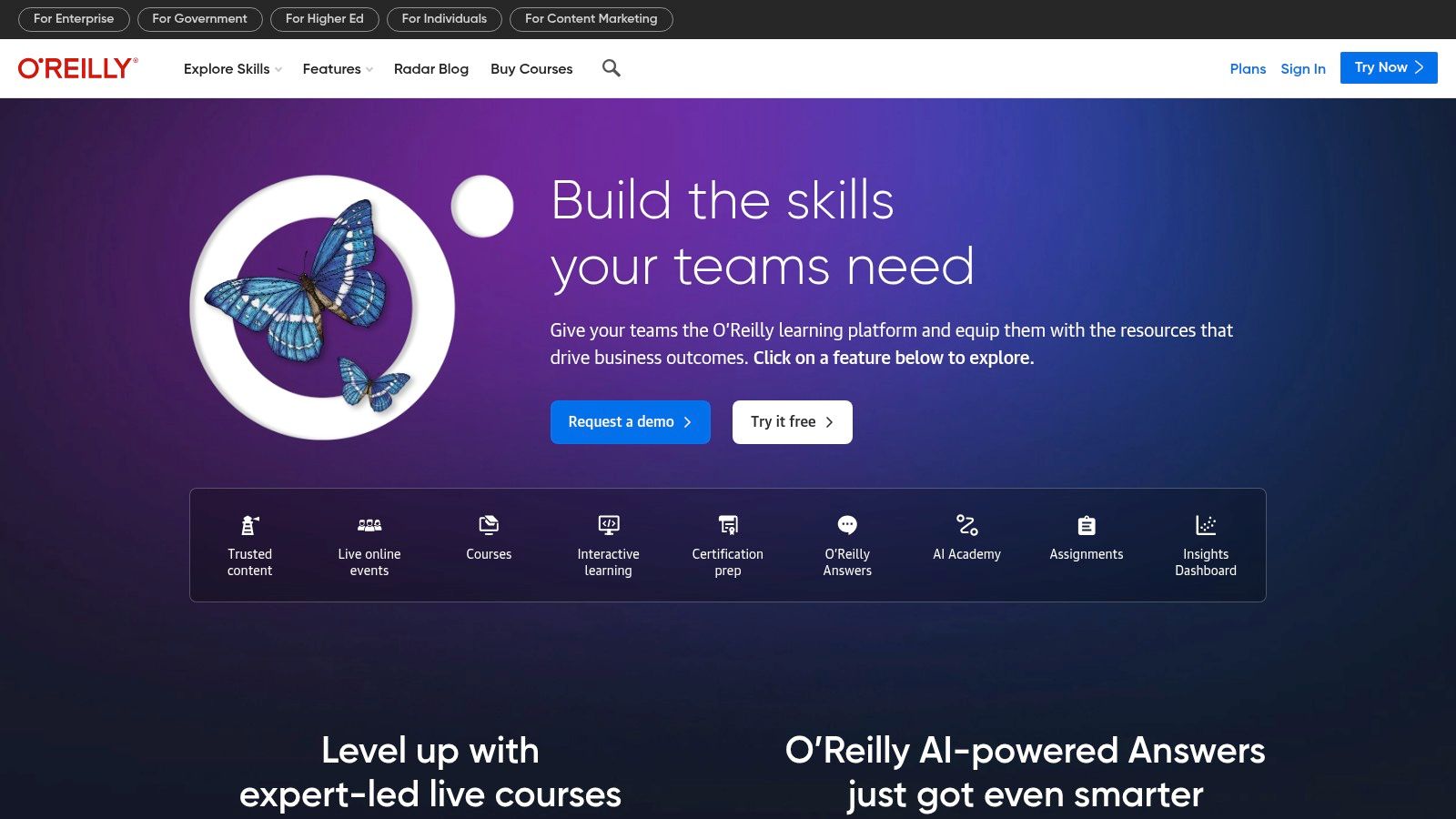
This platform is essential for product managers, engineers, and UX designers who need to learn the applied skills required to build, measure, and learn. Instead of just high-level case studies, you get access to authoritative books and video courses that provide detailed, step-by-step guidance on implementing the very tactics that bring an MVP to life.
Strategic Analysis
O’Reilly’s core value is its comprehensive and highly-vetted collection of content tailored to modern product and engineering teams. The platform gives you direct access to the seminal works that define MVP and lean startup methodologies, allowing you to learn from the original sources. It focuses on the practical application of theory, equipping you with actionable recipes for experimentation and validation.
- Authoritative Content: Access foundational texts like "The Lean Startup" by Eric Ries and "Lean UX" by Jeff Gothelf, alongside thousands of other titles on related disciplines.
- Multi-Format Learning: The platform combines books, video courses, live online training sessions, and curated learning paths to cater to different learning styles.
- Practical Focus: Content often includes code snippets, design patterns, and "experiment recipes" that can be directly applied to your own product development cycle.
Key Takeaway: O’Reilly Learning is the best resource for mastering the practical skills and frameworks needed to execute an MVP. It bridges the gap between high-level strategy and the day-to-day work of building and testing a product.
Practical Information
- Access: O'Reilly operates on a subscription model, providing unlimited access to its entire library of over 60,000 titles for a monthly or annual fee. Free trials are typically available.
- Content Availability: The library is constantly updated, with new and early-release books added frequently. However, some titles may be rotated out over time.
- User Experience: The website (https://www.oreilly.com) features a robust search function and well-organized content categories. Its mobile app allows for offline access to books and videos, making it a convenient tool for continuous learning on the go.
5. Amazon
While many minimum viable product examples showcase software, sometimes the most foundational MVP tool is knowledge itself. Amazon serves as the world's largest marketplace for the essential books that define MVP and lean startup methodologies, such as The Lean Startup by Eric Ries and Testing Business Ideas by David J. Bland and Alexander Osterwalder. It provides immediate, low-friction access to the core frameworks and narratives that guide product development.
For founders, product managers, and developers, Amazon is less about a single product example and more about accessing the entire library of strategic thinking behind them. It allows you to quickly acquire the foundational knowledge needed to build, measure, and learn effectively, regardless of your industry. The platform's extensive customer reviews and "Look Inside" feature also act as a validation tool, helping you choose the most relevant resources for your specific challenges.
Strategic Analysis
Amazon's strategic value lies in its unparalleled accessibility and variety. It democratizes access to high-level business strategy, making it possible for anyone, from a solo founder to a corporate team, to obtain the same foundational texts used in top business schools and accelerators. This removes a significant barrier to entry for learning and applying proven product development frameworks.
- Multiple Formats: Access content in the format that best suits your learning style, whether it's print, Kindle for quick reference, or an audiobook for commuting.
- Community Validation: Customer reviews and ratings act as a form of social proof, guiding you toward the most impactful and highly-regarded resources.
- Low-Cost Entry: The availability of used copies and digital versions makes this essential knowledge highly affordable, aligning with the lean ethos.
Key Takeaway: Amazon is the most efficient and accessible channel for acquiring the fundamental knowledge required to plan and execute an MVP. It centralizes the core literature of the lean startup movement, making it a foundational resource for any product team.
Practical Information
- Access: The books are available for purchase by anyone directly from the website (https://www.amazon.com). Prices vary widely based on format, condition (new/used), and seller.
- Delivery: Amazon Prime offers fast, often next-day, shipping in the US and other regions, ensuring you can get started on your learning journey almost immediately.
- User Experience: The platform is universally familiar, with powerful search, filtering options, and a recommendation engine that suggests related titles. This ecosystem helps teams rapidly build a comprehensive library for their custom web application development projects. Be mindful of third-party sellers, as the quality of non-publisher or spiral-bound versions can vary.
6. Product Hunt
While other minimum viable product examples show a finished product, Product Hunt offers a live, daily stream of MVPs as they launch. It’s a platform where founders and makers introduce their new creations to an audience of tech enthusiasts and early adopters. This makes it a real-time laboratory for studying how today’s startups are defining, messaging, and launching their initial offerings.
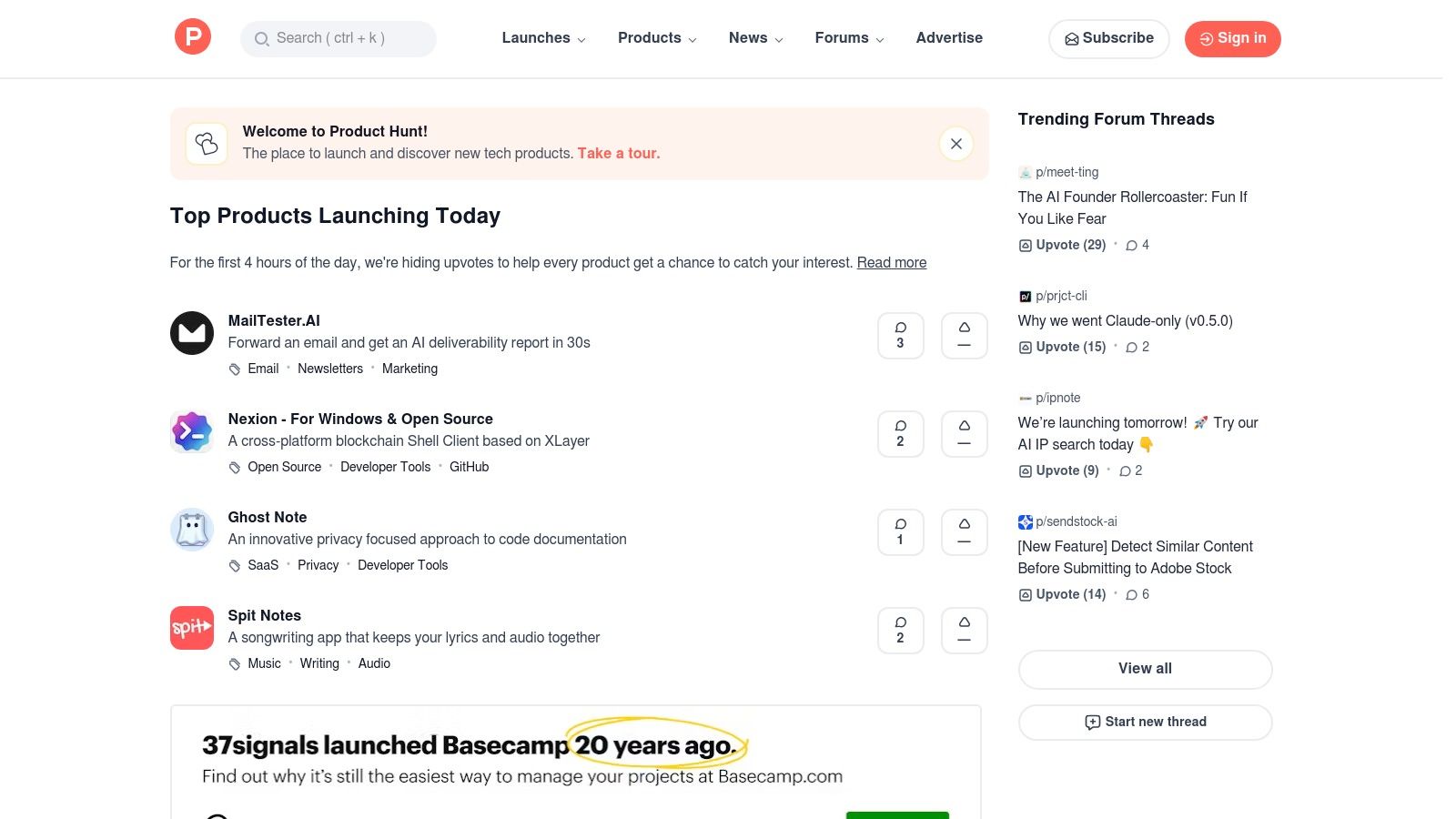
For anyone building their own MVP, Product Hunt is an invaluable resource for both research and execution. You can analyze the scope of newly featured products, observe their pricing strategies (from free to paid tiers), and see the direct feedback they receive from a highly engaged community. It’s a dynamic, ever-changing showcase of what’s currently considered "viable" in the market.
Strategic Analysis
Product Hunt’s core value is its role as a launchpad and proving ground. It provides immediate exposure and validation opportunities that are critical for an MVP. Unlike a static case study, it offers a live look at how the market reacts to a product's core value proposition on day one.
- Real-Time Feedback Loop: The comments and upvotes provide instant qualitative and quantitative data on a product’s appeal.
- Launchpad for Traction: A successful launch can provide the initial user base needed to test hypotheses and start iterating.
- Competitive Intelligence: You can monitor trends, see what features competitors are launching with, and understand how they position themselves to the same early adopter audience.
Key Takeaway: Product Hunt is the best platform for observing MVP launches in real-time and for testing your own. It provides a direct line to early adopters for immediate feedback and initial user acquisition.
Practical Information
- Access: The platform is free to browse and participate in. Launching a product is also free for anyone with a creator account, making it highly accessible for bootstrapped founders.
- Promotion: While launching is free, visibility can be boosted through paid self-serve ads and newsletter features.
- User Experience: The website (https://www.producthunt.com) is designed for discovery, with a clean, feed-based layout. It's easy to browse new products, join discussions, and follow creators. The launch scheduling tools are straightforward, providing a guided process for makers.
7. Y Combinator Startup Library
Where Harvard Business Publishing provides an academic framework, Y Combinator (YC) offers the practitioner's playbook. The Y Combinator Startup Library is a free, high-signal collection of essays, talks, and advice directly from the partners who have helped launch thousands of successful companies. It’s an essential resource for founders looking for tactical, real-world guidance on building minimum viable product examples with extreme speed and focus.
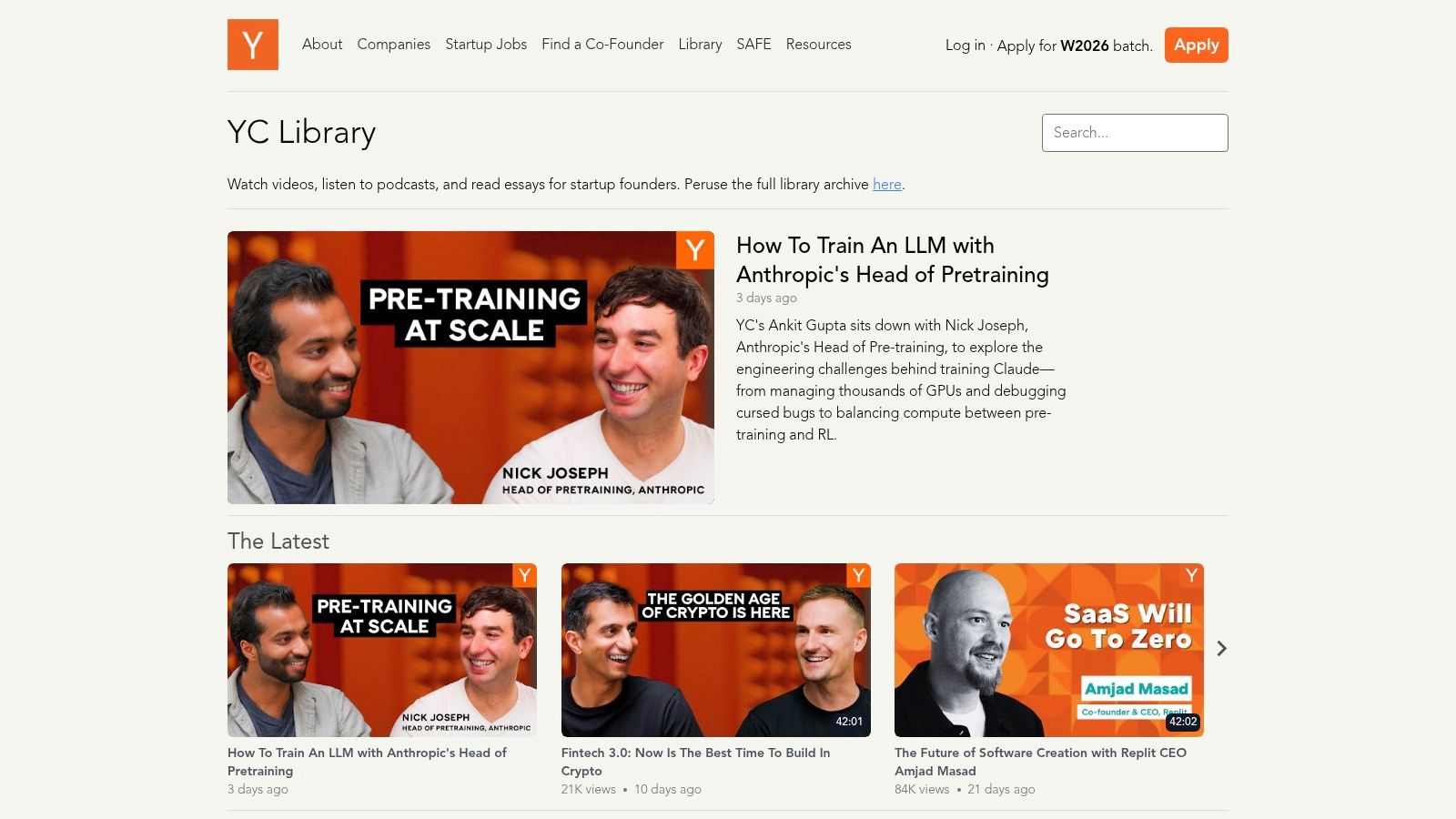
This platform isn't about formal case studies; it's about canonical articles and video lectures that distill years of startup experience into actionable principles. Founders can learn directly how top accelerators think about scoping experiments, validating ideas with paying customers, and achieving the early traction needed for investment. The advice is direct, often contrarian, and relentlessly focused on what matters most in the earliest stages.
Strategic Analysis
The YC Library’s core value is its emphasis on speed and user-centricity over perfection. It teaches founders to prioritize building something simple that a small group of users loves, rather than something complex that many people only like. This philosophy is embedded in all its content, from essays on idea generation to lectures on product-market fit.
- Actionable Advice: The content provides clear, step-by-step guidance, such as how to talk to users and how to define an MVP's minimal feature set.
- Focus on Speed: It consistently reinforces the principle of "launch now" and iterating based on real user feedback.
- Founder-to-Founder Tone: The advice comes from people who have built companies themselves, making it relatable and credible for early-stage entrepreneurs.
Key Takeaway: The YC Startup Library is the best resource for learning the high-velocity, user-obsessed mindset behind building an MVP. It provides the tactical advice and mental models needed to move quickly and build things people actually want.
Practical Information
- Access: All content, including articles and videos from Startup School, is completely free and available to anyone without registration.
- Content Curation: Unlike a structured catalog, the library's value comes from exploring its foundational essays. Users will need to self-curate, but cornerstone articles like "How to Plan an MVP" are invaluable starting points. For a structured approach, you can explore guides on MVP development for startups from 42coffeecups.com.
- User Experience: The website (https://www.ycombinator.com/library) is clean, minimalist, and designed for easy reading. A simple search and tag system helps users navigate the extensive collection of essays and find relevant topics quickly.
7-Source MVP Examples Comparison
| Platform | Implementation Complexity 🔄 | Resource Requirements ⚡ | Expected Outcomes 📊 | Ideal Use Cases 💡 | Key Advantages ⭐ |
|---|---|---|---|---|---|
| Harvard Business Publishing Education | Moderate – requires educator verification for notes | Moderate – per-copy licensing can add up | Rigorous, teachable case studies with discussion | Founders, product managers, educators needing peer-reviewed cases | Authoritative content, searchable catalog, instant digital delivery |
| The Case Centre | Moderate – minimum order rules | Moderate – transparent pricing, discounts | Access to multi-school cases and video supplements | Individual, corporate buyers, educators seeking flexibility | Broad catalog, student discounts, good for non-US buyers |
| Strategyzer | Moderate to High – self-paced courses & software | High – premium pricing for courses | Practical experiment library with recognized frameworks | Users wanting hands-on MVP playbooks and experiment tools | Practical, recognized frameworks, certification available |
| O’Reilly Learning | Low to Moderate – subscription access | High – ongoing subscription cost | Wide-ranging learning with deep dives and live events | Continuous learners in product management, UX, data, development | Vast vetted library, live events, offline/mobile access |
| Amazon | Low – simple purchase and delivery | Low to Moderate – varies by format and seller | Quick access to foundational MVP books and formats | Anyone needing fast, flexible access to MVP & lean startup books | Fast delivery, multiple formats, customer reviews |
| Product Hunt | Moderate – requires active engagement | Low to Moderate – free posting, paid promotions available | Real-time exposure to MVP launches and feedback | Creators launching MVPs, early adopters seeking new products | Real-time MVP insights, launch tools, community engagement |
| Y Combinator Startup Library | Low – free access, self-curated content | Low – free educational essays and talks | Actionable MVP guidance from top accelerators | Early-stage startups, founders learning MVP strategy | High-quality free content, strong focus on speed and experimentation |
Final Thoughts
We've journeyed through a diverse set of real-world minimum viable product examples, from global giants like Amazon to specialized platforms such as Strategyzer and The Case Centre. Each case study reveals a core truth: the MVP is not about building a stripped-down, weak version of your final product. Instead, it’s a powerful strategic tool for learning, validating assumptions, and mitigating risk with maximum efficiency.
The common thread connecting these successful launches is a relentless focus on solving a single, critical problem for a specific user segment. Amazon didn't try to sell everything at once; it started with books. Product Hunt focused solely on curating new tech products for enthusiasts. This laser focus is what creates initial value and attracts early adopters who provide the crucial feedback needed to iterate and grow.
Your Path from Idea to MVP
As you move from inspiration to execution, keep these key takeaways in mind. The most effective MVP strategies are not just about what you build, but what you choose not to build. Prioritization is everything.
- Solve One Problem Brilliantly: Resist the temptation of feature creep. Identify the most painful problem your target audience faces and build a simple, elegant solution for that alone.
- Validate, Don't Assume: Your initial idea is a set of hypotheses. Use the MVP to test these assumptions with real users and gather data. This evidence-based approach is far more reliable than relying on gut feelings.
- Embrace Feedback as a Compass: The purpose of an MVP is to learn. Actively seek out user feedback, both positive and negative, and use it to guide your next development cycle. This loop of building, measuring, and learning is the engine of successful product development.
Before you scale your product, it's essential to confirm that your core solution truly resonates with its intended users. To ensure your Minimum Viable Product truly meets user needs and is ready for broader release, delve into these practical User Acceptance Test examples to structure your final validation phase effectively.
Ultimately, the journey of building a successful product is a marathon, not a sprint. The minimum viable product examples we’ve explored show that starting small, focused, and smart is the most effective way to build momentum. By embracing the MVP mindset, you give your big idea the best possible chance to evolve into a thriving, market-leading solution.
Ready to turn your vision into a reality but need the technical expertise to build it? The team at 42 Coffee Cups specializes in transforming ideas into high-performance web applications, helping founders and product managers launch their MVPs quickly and efficiently. Let us be your dedicated development partner on the path from concept to code.